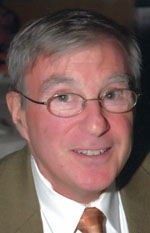The Dream of Zion: The Story of the First Zionist Congress by Lawrence J. Epstein, Rowman & Littlefield, New York; ISBN 978-1-4422-5466-5 ©2016, $36.00, p. 137, plus chronology and references.
By Fred Reiss, Ed.D.

WINCHESTER, California — Professor emeritus Lawrence Epstein in his newest book The Dream of Zion, argues that the nineteenth-century European Enlightenment’s failure to incorporate Jews into mainstream life was the incubator for the modern Zionist movement. Although Theodore Herzl is perhaps Zionism’s most famous representative, Epstein begins by reaching further back into European history to find Herzl’s “stepping stones,” many of whom are hardly household names, including Rabbi Yehudah Alkalai, a Serbian Sephardic rabbi who authored two books asserting that the Messianic redemption needed a human catalyst in the wake of the 1840 blood-libel accusation against Jews in Damascus; Moses Hess, author of Rome and Jerusalem, which told of Jews being part of a nation in need of their own land; and Leo Pinsker, author of the “provocative pamphlet,” Auto-Emancipation.
Publisher and statesman Benjamin Franklin sought status and esteem through the British Crown, but when the government rebuffed him, Franklin found another outlet, the American Revolution. Epstein finds a similar persona in writer and lawyer Theodore Herzl, who pursued prestige through German politics; however, “He simply realized, quite accurately, that politics was closed to him as a Jew…. Herzl was desperate for a life role that matched his self-perception that he was a great man, that society had trapped him as a Jew.” When his play The New Ghetto failed to sell in 1895, Herzl vowed to resolve the burning question, “How to defeat anti-Semitism?” once-and-for-all. After agonizing over alternatives, he concluded that only an autonomous Jewish nation could militate against anti-Semitism.
Epstein painstakingly describes how a mild-mannered man became obsessed with this mission, composing letters to convince wealthy Jewish families, including the Rothchilds, who preferred supporting enclaves of Jewish farmers in Palestine over creating an independent Jewish state, that only a Jewish state guaranteed wealth preservation; meeting with Jewish leaders throughout Europe, especially in Paris and London; dipping into international politics, particularly with the Sultan of Turkey; and eventually burning through his family’s money.
Normally, a parliament is formed to rule a country once it exists; Herzl, counterintuitively, created a congress to lay the groundwork necessary to rule over a non-existent Jewish state. Epstein reserves the largest portion of The Dream of Zion for the three days of the First Zionist Congress. By interspersing quotes from Herzl and Max Nordeau, respectively the President and Vice-President of the Congress, together with his insightful comments and interpretations, Epstein captures the Congress’ grandeur, energy, and political intrigues.
While recreating these heady days, Epstein brings together Herzl’s many successes and the several cabals against him, particularly from members of Hovevei Zion, an early forerunner of Herzl’s Zionism, which supported Jewish immigration to Palestine and believed they should be leading the charge of Jewish nationalism. Epstein likewise points out that Herzl was so fixated on purchasing land in Palestine from Turkey, that he ignored, or at least failed to address, the problem of what to do with Palestine’s resident Arab population.
Herzl, basking in the success of the First Zionist Congress, prophetically wrote in his diary on September 3, 1897, “In Basel I founded the Jewish state. If I were to say this out loud today, everybody would laugh at me. In five years, perhaps, but certainly within fifty, everybody will agree.” Yet success is a relative term. As Epstein informs us, the international reaction to the Congress ranged from the Vatican issuing an encyclical protesting any occupation of “Holy Places by Jews,” to the Kaiser’s musing to let “the kikes go to Palestine, the sooner the better,” to Mark Twain’s articulating, “But if that concentration of the cunningest brains in the world was going to be made in a free country… I think it would be politic to stop it. It will not be well to let that race find its strength. If horses knew theirs we should not ride anymore.” The First Zionist Congress did little to gain international support, but certainly provided the fuel to the perverse belief in an international Jewish conspiracy and the rise of Palestinian Arab nationalism.
The final chapter recounts the sad endings to Herzl and his family and the growth of divergent ideas about Zionism’s goals and means. However, Epstein, summarizing Herzl’s genius, concludes, “That there were so many efforts in so many places over such a long span of time provides remarkable evidence that there was no nationalistic alternative to Zionism.”
The Dream of Zion is a wonderful narration of the life of Theodore Herzl, his many successes, his endurance of hardships, and his tenacity displayed on behalf of the Jewish nation. Additionally, The Dream of Zion clearly shows that neither Herzl’s political perception, nor the outcomes of the First Zionist Congress were perfect, but together they perfectly proved that once set free, the Jewish spirit, eager to recapture its ancient homeland, could no longer be contained.
*
Dr. Fred Reiss is a retired public and Hebrew school teacher and administrator. He is the author of The Standard Guide to the Jewish and Civil Calendars; Public Education in Camden, NJ: From Inception to Integration; Ancient Secrets of Creation: Sepher Yetzira, the Book that Started Kabbalah, Revealed; and a fiction book, Reclaiming the Messiah. The author can be reached via fred.reiss@sdjewishworld.com. Comments intended for publication in the space below must be accompanied by the letter writer’s first and last name and by his/ her city and state of residence (city and country for those outside the U.S.)